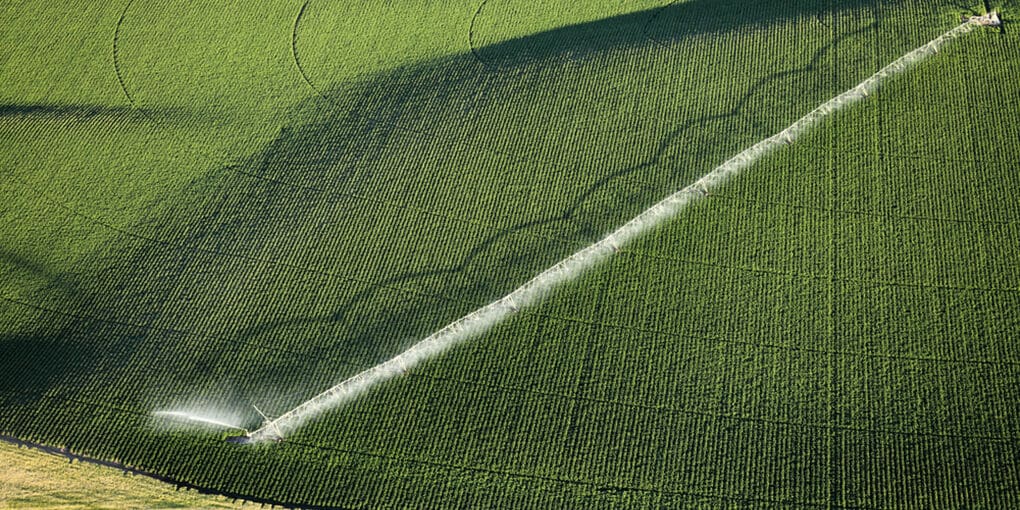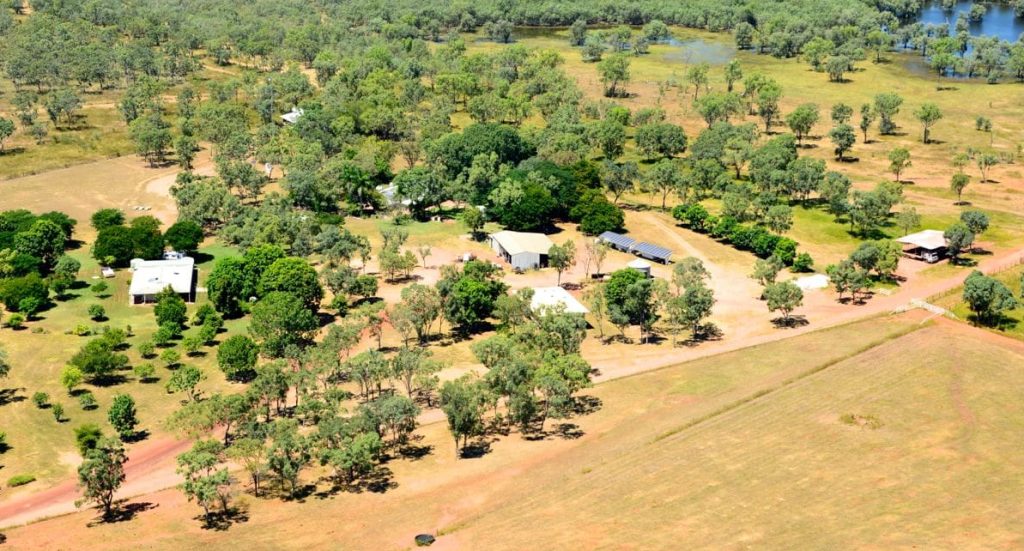
Only a small portion of the NT’s current cotton crop is under irrigation. Photo: Envirada
PLANS to expand irrigated cotton production in the Northern Territory have gained momentum, with Larrimah Farms securing approval for a water licence to extract 10,000 megalitres a year and another project seeking a boost to its allocation.
The news comes as the Northern Territory Court of Appeal last Monday dismissed an appeal against Fortune Agribusiness’ water licence, which would support plans to develop 3500ha of horticultural crops at Singleton Station, about 120km south of Tennant Creek.
Only a fraction of the NT current cotton crop is irrigated, with no more than 500ha of the roughly 10,000ha planted for the 2024-25 season grown under centre pivots.
Larrimah Farms is a consortium between former New South Wales farmer Jamie Schembri and an unnamed South Australian family which was formed to develop the Larrimah Agricultural Precinct, a 5712ha parcel located near the Larrimah township.
In February 2024, the company applied to the NT Government for a 10,000ML-per-year groundwater extraction licence to irrigate crops including 800ha of cotton, 300ha of melons, 150ha of mangoes, and 150ha of permanent hay forage.
The application was approved earlier this month.
NT controller of water resources Andrew Johnson said in the decision document that the proposal was “unlikely to have adverse effects on any water users or groundwater-dependent receptor”.
“Granting this licence supports the objective of providing access to water to support regional development for the benefit of The Territory,” Mr Johnson said.
“The plan has been informed by extensive research and comprehensive surface and groundwater modelling, incorporating monitoring and assessment studies undertaken over many decades.”
Twelve individual submissions and a pro-forma letter signed by 66 people were received during the community consultation process, raising concerns about the scale of the proposed water allocation, potential impacts on other users, reduced flows to surrounding watercourses, and broader opposition to using water for cotton production.
These submissions came from a range of stakeholders including residents, traditional owners, environmental groups, the Northern Land Council, and academics.
In response to the license approvals, the Environment Centre NT said the move demonstrated that “rainfed cotton [was] clearly not viable in the NT”.
The organisation also noted that a water licence for the same property was revoked in 2021 following a successful challenge.
“The massive water licence at Larrimah endangers Mataranka Hot Springs and the Roper River, and goes against the calls from communities to stop further extraction from this system,” ECNT executive director Kirsty Howey said.
“’Big Cotton’ is lining up for the Territory’s free water, finally exposing claims that the cotton industry would be rainfed as lies.”

Dry River Station near Katherine. Photo: Paspaley
Paspaley Pastoral application
The potential of irrigated cotton was also at the centre of Paspaley Pastoral Company’s recent application to increase its water-extraction entitlements from about 7000ML to more than 9677ML per year.
Paspaley operates Dry River Station, a 65,000ha property near Katherine, where four centre pivots over 289ha are already in place for growing cotton and forage sorghum.
In its application, the company said it proposed a staged irrigation development which would include the “addition of nine centre pivots irrigating 527.2ha over the 10-year period for a total irrigated area of 816.2ha”.
“The proposed irrigation development is expected to include a rotation of grain sorghum, rhodes grass, cavalcade and cotton cropping in the wet season; and oats, rhodes grass and forage sorghum cropping in the dry season,” the application said.
Cavalcade is a prostrate annual twining legume.
Ms Howey said this proposal would put “the stunning Flora Springs and Daly system at serious risk”.
Fortune court win
Also this month, the Fortune Agribusiness and the NT Government won an appeal brought by the Mpwerempwer Aboriginal Corporation over a water-extraction licence for the Singleton Farm project.
Fortune proposes developing about 3500ha of Singleton Station for the purpose of intensive irrigated horticulture, growing crops such as mandarins, table grapes, dried grapes, onions, avocados, muskmelons, and jujube.
The NT Court of Appeal dismissed the appeal and upheld the decision of the Supreme Court.
Minister for Agriculture and Fisheries Gerard Maley said this provided long-awaited certainty for one of the NT’s most significant horticulture developments.
“Fortune Agribusiness has been transparent, cooperative and constructive throughout the entire process, and we welcome their ongoing commitment to investing in Northern Australia,” Mr Maley said.
“This is an important milestone for the Singleton Farm project, which aims to create more than 1,000 jobs and drive long-term economic growth in the Barkly.”
On behalf of the MAC, Central Land Council chief executive Les Turner said the group acknowledged the court’s judgement.
“We will consider the reasons behind the judgment once they are released, explain them to the native title holders and remote communities affected by the controversial water licence, and seek their instructions,” Mr Turner said.
“They have said many times that they will never stop fighting against the licence that threatens their sacred sites and their communities’ water security, so we’ll consider all avenues open to them now.”
Grain Central: Get our free news straight to your inbox – Click here

HAVE YOUR SAY